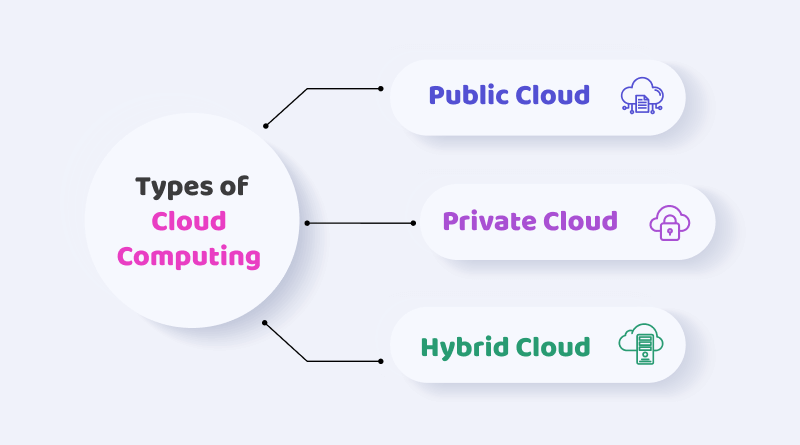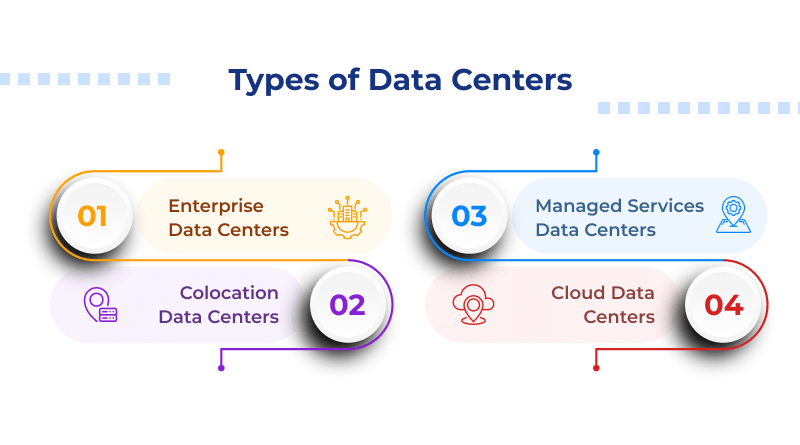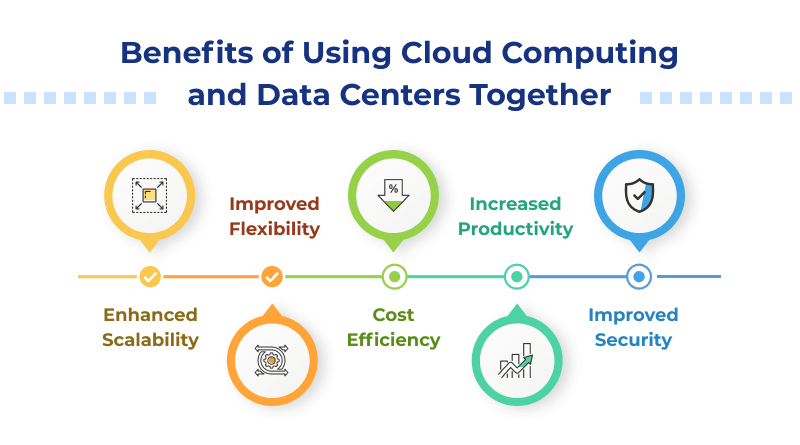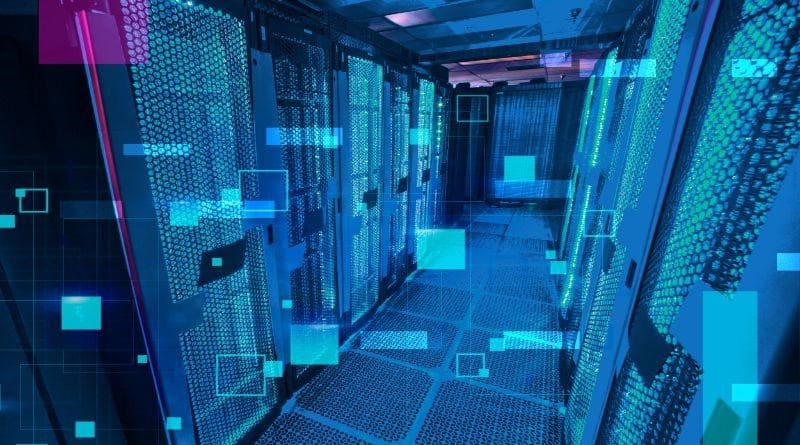In today’s fast-paced digital landscape, cloud computing has become a dominant force in the world of technology. The ability to store and access data remotely has revolutionized how businesses work, communicate, and function. And if you also want to march along with this fast paced world at affordable prices, cheap cloud hosting solutions are right for you.
However, behind every cloud service is a data center — the backbone of the entire operation. Data centers process the vast amounts of information that make the digital world possible. Despite their vital roles, the relationship between data centers and cloud computing can be complex and difficult to understand.
This blog post explains the relationship between the data center and cloud computing and how they work in conjunction to provide the corporate world with a seamless cloud computing experience. Let’s dive in!
Table Of Content
What is Cloud Computing?
Cloud computing is renting computing resources, including servers, storage, applications, and databases, over the web network rather than owning physical infrastructure on-premises. This allows businesses more flexibility, scalability, and efficiency in exchange for a service cost set by the cloud service providers (CSPs).
Cloud computing uses the internet to provide a pool of configurable IT resources that can be accessed on demand. Only minimal management effort is required to provide and release these resources quickly. Housed in the cloud based data center operated by CSPs, cloud infrastructure is made available to users via a network of servers distributed across multiple locations.
Cloud computing services are typically offered through three service models:
- Infrastructure as a Service (IaaS): IaaS enables access to virtualized computing resources, including servers, storage, and networking.
- Platform as a Service (PaaS): PaaS unlocks a platform for developing, testing, and deploying applications.
- Software as a Service (SaaS): SaaS provides users with access to software applications that the cloud service provider hosts.
Related: A Buyer’s Guide to Cloud Managed Services
Types of Cloud Computing
Cloud service models define users’ control and management over the underlying computing resources. Enlisted below are the three main types of cloud computing deployment models:

1. Public Cloud:
This is a cloud computing deployment model where third-party providers offer cloud services over the internet. These providers own and manage the infrastructure and offer computing resources to multiple customers.
2. Private Cloud:
A private cloud is a confidentiality-focused cloud computing deployment model dedicated to a single organization. Private clouds can be hosted on-premises or by a third-party provider, offering high control, security, and customization. Private clouds are typically used by organizations that require strict security and compliance regulations or have highly specialized computing requirements.
3. Hybrid Cloud:
Combining elements of public and private clouds, the hybrid cloud provides the best of both worlds. In a hybrid cloud, an organization can use public cloud services for non-sensitive data and applications while keeping sensitive data and applications in a private cloud.
Try Our Fully Managed Cloud Hosting To Scale Your Web Project!
What is Data Center?
A data center is a facility that accommodates computing systems and associated components, such as telecommunications and storage systems. Featuring advanced power and cooling systems, data centers ensure reliable and uninterrupted operation of the housed equipment.
Data center facilities can range from small server rooms to large enterprise-level facilities spanning multiple buildings. Devised to store, manage, and transfer information, data centers enable organizations to operate large amounts of data securely and efficiently.
Any organization that relies heavily on technology and data management needs a data center to support critical business operations. Corporate businesses, government agencies, and other institutions and associations are all first-line consumers of these data hubs.
Types of Data Centers
Based on ownership, location, and services provided, data centers are typically classified into the following four types:

1. Enterprise Data Centers:
Large organizations own and operate these to support their IT infrastructure needs. Enterprise data centers are often on-premises and can house servers, storage, networking, and other IT equipment.
2. Colocation Data Centers:
Colocation hosting data centers are typically developed to be carrier-neutral, enabling web hosting companies to link to multiple network providers. These third-party facilities offer storage, power, refrigeration, and security for businesses to accommodate IT equipment.
3. Managed Services Data Centers:
Managed services data centers can be either enterprise-owned or third-party-operated. These facilities offer managed services, including IT operations, surveillance, and sustenance.
4. Cloud Data Centers:
Cloud data centers are operated by cloud service providers (CSP) or large organizations offering private cloud services. These facilities host cloud computing resources, including servers, storage, and networking infrastructure.
Data Center Technology In Cloud Computing
Data center technology is the backbone that keeps cloud computing running efficiently and reliably. Here are some key areas of technology that cloud data centers utilize:
1. Computing Resources
- Servers: These are the workhorses of the data center, responsible for processing data and running applications. Cloud data centers often leverage virtualization technology, which allows a single physical server to host multiple virtual servers, maximizing resource utilization.
- Storage: Data centers employ various storage technologies like Hard Disk Drives (HDDs) for bulk storage, Solid-State Drives (SSDs) for faster access, and object storage for large, unstructured data.
2. Networking
- High-speed networks: Cloud data centers rely on robust networking infrastructure to ensure high-bandwidth data transfer between servers, storage systems, and the Internet. This allows for the smooth operation of cloud services.
- Content Delivery Networks (CDNs): These geographically distributed networks deliver content to users with minimal latency by caching data closer to their location. This is crucial for ensuring a good user experience with cloud-based applications.
3. Management and Automation
- Infrastructure as Code (IaC): This approach uses code to define and provision data center resources, automating tasks and enabling faster deployment and configuration changes.
- Software-Defined Networking (SDN): This technology allows for programmatic control of the network, offering greater flexibility and automation in managing data center traffic.
4. Emerging Technologies
- Artificial Intelligence (AI) and Machine Learning (ML): These technologies are used for optimizing resource allocation, predicting workload demands, and automating data center operations, leading to greater efficiency and cost savings.
- Hyperconverged Infrastructure (HCI): This combines computing, storage, and networking resources into a single, pre-configured system, simplifying data center management.
What is The Difference Between Data Centers and Cloud Computing?
Data centers and cloud computing are often used interchangeably but are quite different. While data center facilities and cloud computing both deal with data storage and processing, they have distinct features.
The following table summarizes the key differences between data centers and cloud computing:
| Data Center vs. The Cloud | |||
| Point of Difference | Data Center | Cloud Computing | |
| Definition | A physical facility for storing, managing, and processing data | A virtualized service that provides on-demand access to computing resources | |
| Ownership | Owned and managed by the organization itself | Owned and managed by a third-party provider | |
| Infrastructure | Dedicated hardware and software | Shared hardware and software | |
| Scalability | Limited by physical capacity and upgrades | Highly scalable, can quickly add or remove resources | |
| Availability | Limited by physical location and connectivity | Accessible from anywhere with an internet connection | |
| Security | Typically provides physical and network security | The provider manages security measures | |
| Cost | High initial capital investment and ongoing maintenance | Pay-as-you-go model; more cost-effective for small businesses and startups | |
| Customization | Highly customizable to meet specific needs | Limited customization options for off-the-shelf services | |
| Reliability | Depends on the quality of the hardware and maintenance | High reliability due to redundant hardware and failover systems | |
Data Center In Cloud Computing
A data center in cloud computing is the physical foundation that makes everything run smoothly. Here’s a breakdown:
- Physical Location: It’s a secure, controlled facility housing the hardware that makes cloud computing possible. This hardware includes servers, storage systems, and networking equipment.
- Cloud Infrastructure: These data centers house the essential building blocks for cloud services, like virtual machines, storage, and databases.
- Resource Sharing: Unlike traditional data centers owned by a single company, cloud data centers are designed to serve multiple clients. Clients can rent the resources they need, like storage space or processing power, instead of maintaining their infrastructure.
In short, data centers are the powerhouses behind cloud computing. They provide the essential infrastructure that allows cloud providers to offer services like storage, compute power, and databases on-demand.
What is The Relationship Between Cloud Computing and Data Centers?
Cloud computing and data centers are intimately related as they depend on each other to operate effectively. Data centers are the mainstay of cloud computing, supplying the infrastructure that allows cloud services to function properly.
Similarly, cloud computing provides high flexibility and scalability for data centers, enabling them to grow and adapt to shifting demands. Simply put, the relationship between cloud computing and data centers is symbiotic. Both facilities support, complement, and embrace each other to serve the common objective: deliver streamlined customer service.
Related: The Future Of Data Centers And Its Role In The IT Industry
Data Centers Provide the Infrastructure for Cloud Computing
Data centers are the fundamental building blocks of cloud computing. Cloud computing involves the delivery of computing resources and services over the internet. These resources are typically hosted in data centers, which are large facilities that house vast amounts of computing equipment, storage devices, and networking infrastructure.
The data centers provide the necessary infrastructure and support for cloud services, allowing users to access and use applications and data from anywhere with an internet connection. Thus, the relationship between cloud computing and data centers is interdependent, as cloud computing cannot exist without data centers.
Cloud Computing Offers Flexibility and Scalability for Data Centers
Cloud computing has revolutionized the way data centers operate. It offers unparalleled flexibility and scalability, enabling data centers to accommodate ever-changing business needs.
The cloud allows data center operators to provision and de-provision resources quickly and easily. With cloud computing, these shifts in accessibility are possible without incurring the significant costs and downtime associated with physical infrastructure changes.
This agility helps data centers stay competitive and responsive to market demands, making cloud computing a vital tool for modern businesses.
Data Center Facilities vs. The Cloud: Which is Best for Your Business?
Cloud computing and data centers are two of the most significant technological innovations of the modern epoch. While cloud computing is a relatively new concept, data centers have been around for decades. However, the two technologies are related and advised to be used together to create a powerful and efficient computing environment.
Leveraging both technologies, businesses can create a hybrid IT environment that combines the reliability and security of a data center with the agility and scalability of the cloud. For instance, businesses can use a data center to host their critical applications and sensitive data while using the cloud for non-critical workloads or to handle spikes in demand. Consequently, businesses can enjoy more control, scalability, and cost-effectiveness over their critical IT resources.
Moreover, combining data centers and the cloud can also provide geographic redundancy and disaster recovery capabilities. By using a hybrid infrastructure, businesses can replicate their critical applications and data across multiple locations, subsiding the risk of downtime and data loss.
Benefits of Using Cloud Computing and Data Centers Together
Cloud computing and data centers are two distinct but interconnected concepts businesses can combine to achieve their IT goals. While each technology has unique benefits, combining the two can maximize their capabilities and unlock even more value.

Below are five of the key benefits of using cloud computing and data centers together:
1. Enhanced Scalability
One of the most significant benefits of combining cloud computing and data centers in conjunction is scalability. As such, it allows for quickly scaling computing resources up or down per one’s needs.
With cloud computing, businesses can quickly add or remove computing resources as their demand fluctuates without going through the hassle of purchasing and setting up new hardware. This flexibility means companies can easily handle traffic and workload spikes, ensuring their applications and services are consistently performant.
2. Improved Flexibility
Another benefit of using cloud computing and data centers together is flexibility. Cloud computing allows businesses to quickly deploy and manage applications and data, which can be especially useful when responding to changing market conditions or customer demands.
With the ability to quickly spin up new instances and services, organizations can experiment with contemporary features and ideas and quickly iterate on their product offerings. Additionally, data centers provide a secure and reliable environment for storing and accessing that data. This is particularly crucial for businesses that deal with sensitive information.
Related: Common Challenges in Cloud Security and Their Solutions
3. Cost Efficiency
Corporate businesses can save money on infrastructure costs by leveraging the benefits of cloud computing and data centers. The cost of managing and maintaining the computing resources is also significantly reduced.
Cloud computing allows companies to opt for the pay-as-you-go model, which means that they don’t have to invest in expensive hardware they might only use sporadically. Moreover, cloud infrastructure is entirely managed and maintained by the cloud provider. Consequently, businesses are set free of the hassle of cost and complexity of maintaining and upgrading the hardware.
Similarly, data centers can also offer major cost savings by offering economies of scale. By sharing IT resources with other businesses, companies can reduce the cost of power, cooling, and other expenses.
4. Increased Productivity
Using cloud computing and data centers together can also increase productivity. A business can quickly deploy and manage applications and data with cloud computing. This efficiency allows them to stay ahead of the competition and respond quickly to customer needs.
Data centers provide a secure and reliable environment for storing and accessing that data. Consequently, companies can streamline workflows and focus on their core business activities instead of spending time on IT maintenance and troubleshooting. This IT automation frees up time for innovation and creativity.
5. Improved Security
Cloud computing and data centers combined can improve the overall security posture of any organization. Cloud computing provides advanced security features and protocols, such as data encryption, identity and access management, and threat detection and response. These features help to protect the data and applications from cyber threats and other security risks.
Data centers also supply a secure and reliable environment for storing and accessing critical data with optimal redundant power, network connections, and disaster recovery capabilities. By leveraging the expertise and resources of cloud providers and data center operators, companies can protect themselves from potential security breaches and data loss.
Cloud computing and data centers are highly intertwined. The synergy between cloud computing and data centers is critical for the success of digital transformation and the growth of businesses in the digital era.
With the ever-increasing demand for digital services and the need for scalability and flexibility, cloud computing has become the go-to solution for many organizations worldwide. However, this wouldn’t have been possible without the support of robust and efficient data centers providing the necessary infrastructure for cloud services.
Since technology continues to evolve, we expect to see further advancements in cloud computing and data center technologies, further enhancing reliability, performance, and security for businesses.
We hope that you found this article informative and useful in understanding the relationship between cloud computing and data centers. We would love to hear your thoughts on this topic and any experiences you may have had with cloud services or data centers. Please feel free to leave a comment below to share your insights, questions, or opinions. Your comments can help to start a meaningful discussion and contribute to the collective knowledge of our community.
FAQs – Relationship Between Data Centers And Cloud Computing
What is the relationship between cloud computing and data centers?
Cloud computing relies on data centers to provide the physical infrastructure needed for storage and processing. Data centers house servers and networking equipment essential for delivering cloud services. This relationship allows scalable, on-demand computing resources to be available globally.
How do data centers support cloud computing services?
Data centers support cloud computing by providing the necessary hardware and infrastructure. They ensure optimal performance and reliability through servers, storage devices, and networking equipment. This infrastructure enables high availability and scalability for cloud services.
What are the benefits of using data centers for cloud computing?
Data centers offer scalability, enhanced security, and high availability for cloud services. They provide cost savings by eliminating the need for businesses to invest in their IT infrastructure. Data centers also facilitate faster deployment and improved business agility.
How do data centers contribute to the flexibility of cloud computing?
Data centers enable the on-demand allocation of resources, allowing businesses to quickly adapt to changing needs. They support virtualized environments for efficient resource management and quick service provisioning. The global distribution of data centers ensures low latency and high performance for users.















